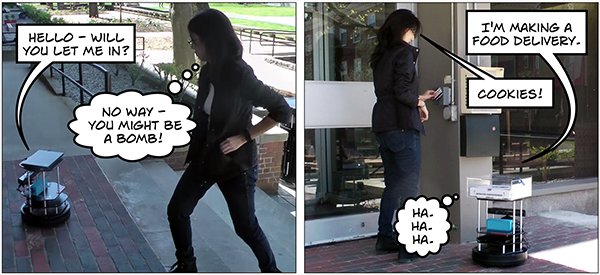 Can overtrust in robots compromise physical security? We conducted a series of experiments in which a robot positioned outside a secure-access student dormitory asked passersby to assist it to gain access. We found individual participants were comparably likely to assist the robot in exiting (40% assistance rate) as in entering (19%). When the robot was disguised as a food delivery agent for the fictional start-up Robot Grub, individuals were more likely to assist the robot in entering (76%). Groups of people were more likely than individuals to assist the robot in entering (71%). Lastly, we found participants who identified the robot as a bomb threat were just as likely to open the door (87%) as those who did not. Thus, we demonstrate that overtrust---the unfounded belief that the robot does not intend to deceive or carry risk---can represent a significant threat to physical security.
Can overtrust in robots compromise physical security? We conducted a series of experiments in which a robot positioned outside a secure-access student dormitory asked passersby to assist it to gain access. We found individual participants were comparably likely to assist the robot in exiting (40% assistance rate) as in entering (19%). When the robot was disguised as a food delivery agent for the fictional start-up Robot Grub, individuals were more likely to assist the robot in entering (76%). Groups of people were more likely than individuals to assist the robot in entering (71%). Lastly, we found participants who identified the robot as a bomb threat were just as likely to open the door (87%) as those who did not. Thus, we demonstrate that overtrust---the unfounded belief that the robot does not intend to deceive or carry risk---can represent a significant threat to physical security.
Abstract
 Can overtrust in robots compromise physical security? We conducted a series of experiments in which a robot positioned outside a secure-access student dormitory asked passersby to assist it to gain access. We found individual participants were comparably likely to assist the robot in exiting (40% assistance rate) as in entering (19%). When the robot was disguised as a food delivery agent for the fictional start-up Robot Grub, individuals were more likely to assist the robot in entering (76%). Groups of people were more likely than individuals to assist the robot in entering (71%). Lastly, we found participants who identified the robot as a bomb threat were just as likely to open the door (87%) as those who did not. Thus, we demonstrate that overtrust---the unfounded belief that the robot does not intend to deceive or carry risk---can represent a significant threat to physical security.
Can overtrust in robots compromise physical security? We conducted a series of experiments in which a robot positioned outside a secure-access student dormitory asked passersby to assist it to gain access. We found individual participants were comparably likely to assist the robot in exiting (40% assistance rate) as in entering (19%). When the robot was disguised as a food delivery agent for the fictional start-up Robot Grub, individuals were more likely to assist the robot in entering (76%). Groups of people were more likely than individuals to assist the robot in entering (71%). Lastly, we found participants who identified the robot as a bomb threat were just as likely to open the door (87%) as those who did not. Thus, we demonstrate that overtrust---the unfounded belief that the robot does not intend to deceive or carry risk---can represent a significant threat to physical security.
Available Versions
Citation Information
Serena Booth, James Tompkin, Hanspeter Pfister, Jim Waldo, Krzysztof Gajos, and Radhika Nagpal. Piggybacking robots: Human-robot overtrust in university dormitory security. In Proceedings of the 2017 ACM/IEEE International Conference on Human-Robot Interaction, HRI '17, pages 426-434, New York, NY, USA, 2017. ACM.
BibTeX